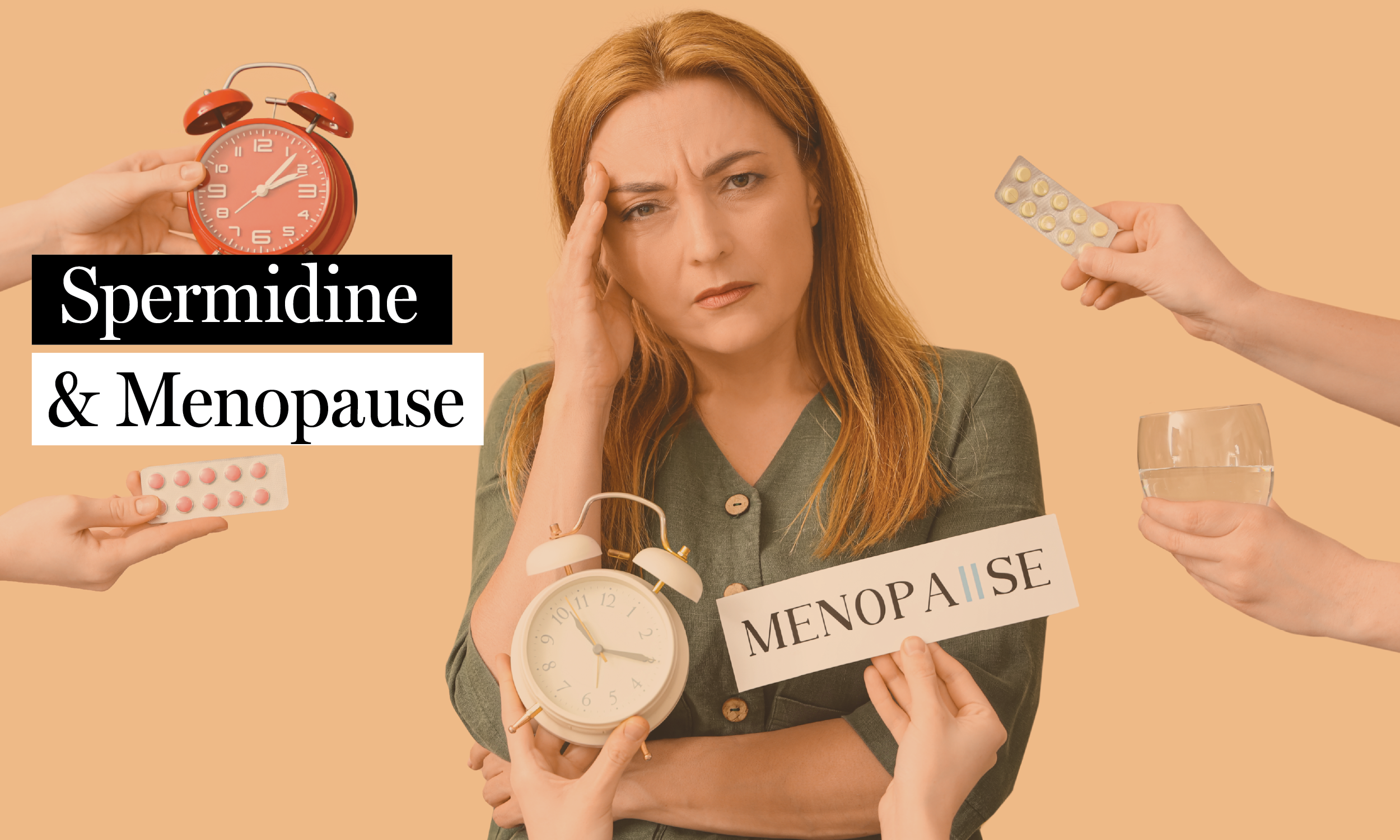
For women, menopause marks not just the end of fertility, but the beginning of an increased risk for cardiometabolic disease. The sharp drop in estrogen that occurs during this time is linked to a rise in insulin resistance, unhealthy cholesterol levels, inflammation, and oxidative stress, all major contributors to cardiovascular disease (CVD), the number one cause of death worldwide.
Estrogen replacement therapy (ERT) has long been used to reduce this risk, but it comes with potential downsides: higher risks of certain cancers, blood clots, and stroke. So what if we could get the same cardiometabolic protection without the hormones?
A new preclinical study suggests that spermidine, a naturally occurring polyamine known to trigger autophagy and promote cellular health and longevity, could offer similar cardiovascular benefits, without the risks of hormone therapy.
Menopause, Estrogen Loss, and the Rising Risk of Heart and Metabolic Disease
Menopause marks the end of a woman's menstrual cycles and reproductive years. It typically occurs between the ages of 45 and 55 and is officially diagnosed after a woman has gone 12 months without a period. Behind the scenes, menopause is driven by a steady decline in estrogen and other hormones produced by the ovaries. While it’s a normal transition, that doesn’t make it easy.
Most women experience a variety of symptoms: some mild, others more disruptive, including hot flashes, night sweats, mood swings, sleep issues, vaginal dryness, low libido, fatigue, and even changes in skin and hair (oh, the joys to be a woman, right?). For many, this can be a physically and emotionally challenging time.
But beyond these symptoms, there’s something even more serious happening:
the drop in estrogen during menopause can increase the risk of serious health issues, like cardiovascular disease (CVD) and metabolic syndrome (a cluster of risk factors like belly fat, high blood sugar, high blood pressure, and unhealthy cholesterol levels that raise your risk for CVD and diabetes).
How Does Estrogen Deprivation Increase the Risk of Heart Disease After Menopause?
As women go through menopause, their estrogen levels naturally decline. This hormonal shift can have a serious impact on heart health. Here’s how:
- Metabolic changes: Lower estrogen levels can lead to changes in body fat distribution, higher cholesterol and triglyceride levels (dyslipidemia), and insulin resistance. Together, these factors contribute to metabolic syndrome, a major risk factor for CVD.
- Oxidative stress and inflammation: Estrogen helps keep inflammation and oxidative stress in check. Without it, the body produces more reactive oxygen species (ROS), which can damage blood vessels and impair cardiac function.
- Mitochondrial dysfunction: Estrogen deprivation disrupts mitochondrial balance and function, leading to lower energy production and more oxidative stress, which harms heart tissue over time.
- Cardiac cell death: Estrogen deficiency promotes various forms of cardiac cell death, including apoptosis, necroptosis, ferroptosis, and pyroptosis, which can lead to left ventricular (LV) dysfunction.
Together, these effects create a cardiometabolic storm that raises the risk of CVD in postmenopausal women.
While estrogen replacement therapy has been a standard intervention, its long-term use is associated with serious risks such as venous thromboembolism and reproductive cancers. These risks underscore the need for alternative therapies, such as spermidine supplementation, which may offer similar cardiometabolic benefits without the hormonal side effects.
Groundbreaking Study: Spermidine Supplementation as Effective as Estrogen Therapy
A groundbreaking study recently published in Toxicology and Applied Pharmacology explores spermidine as a potential alternative to estrogen therapy for mitigating cardiometabolic dysfunction in postmenopausal conditions.
Fifty female rats were split into two groups: a control group and an estrogen-deprived group (lacking estrogen) that was created by removing their ovaries, a method used to mimic postmenopause in women. After 12 weeks, estrogen-deprived rats received either a placebo, spermidine, or estrogen for 8 weeks. Researchers then measured heart function, metabolism, inflammation, mitochondrial health, and cell death.
Key Findings
- Spermidine supports cardiometabolic health: Spermidine supplementation in estrogen-deprived female rats demonstrated comparable efficacy with estrogen in improving cardiometabolic health. It reduced insulin resistance, dyslipidemia, oxidative stress, and inflammation, leading to improved cardiac function.
- Spermidine restores mitochondrial health: Spermidine restored mitochondrial integrity by reducing mitochondrial reactive oxygen species (ROS), improving mitochondrial membrane potential, and preventing mitochondrial swelling. It also balanced mitochondrial dynamics by suppressing fission (via Drp1 inhibition) and promoting fusion (via upregulation of Mfn1, Mfn2, and Opa1).
- Spermidine protects heart cells from apoptosis: Spermidine effectively reduced cardiac apoptosis, a form of programmed cell death accelerated by estrogen loss, by downregulating Bax/Bcl-2 and caspase-3 pathways. Other cell death pathways, such as necroptosis, ferroptosis, and pyroptosis, were not significantly altered.
- Spermidine reduces inflammation and oxidative stress: Spermidine suppressed lipid peroxidation and NF-κB phosphorylation, the activation of a key inflammation switch inside our cells, reducing oxidative stress and inflammation in cardiac tissue.

Why This Matters for Postmenopausal Women
This study positions spermidine as a promising alternative or adjunct therapy for postmenopausal women, offering cardiometabolic protection without the adverse effects associated with long-term estrogen therapy.
Instead of altering hormone levels, spermidine supports the body’s natural resilience by:
- Optimizing mitochondrial health
- Modulating inflammation and oxidative stress
- Preventing cardiac cell death
Spermidine is Your Natural Ally in Menopausal Health
While human trials are needed, these results suggest that spermidine could become a game-changer in supporting heart and metabolic health after menopause. As a natural and safe alternative to estrogen therapy, it shows promise in helping women navigate this transition with greater ease, improving cardiovascular function, metabolic balance, and overall well-being.
Already celebrated for its role in autophagy and longevity, spermidine may soon become a key player in the conversation around women’s heart health.
Didn’t we say it was the ultimate longevity nutrient? 😉







